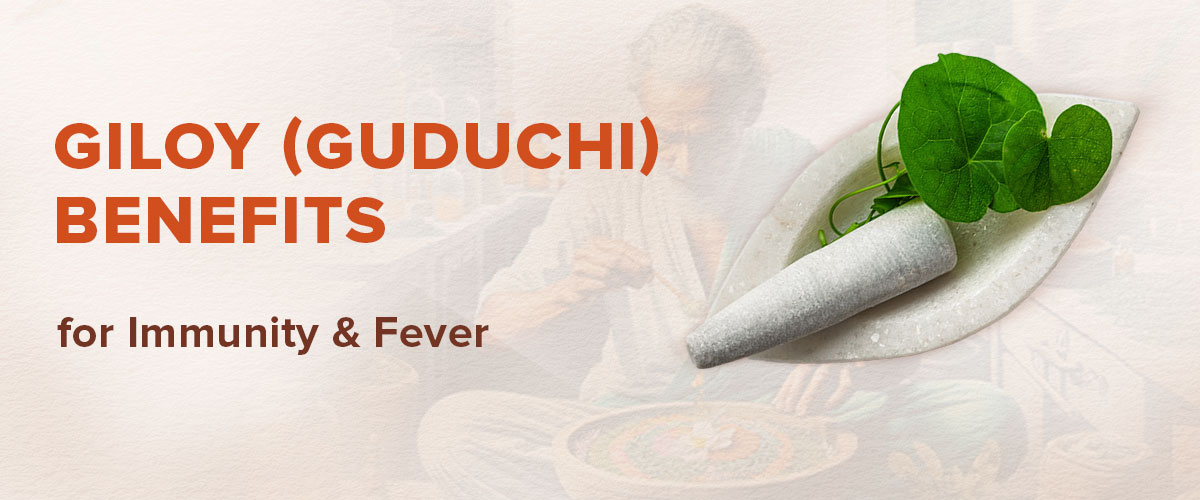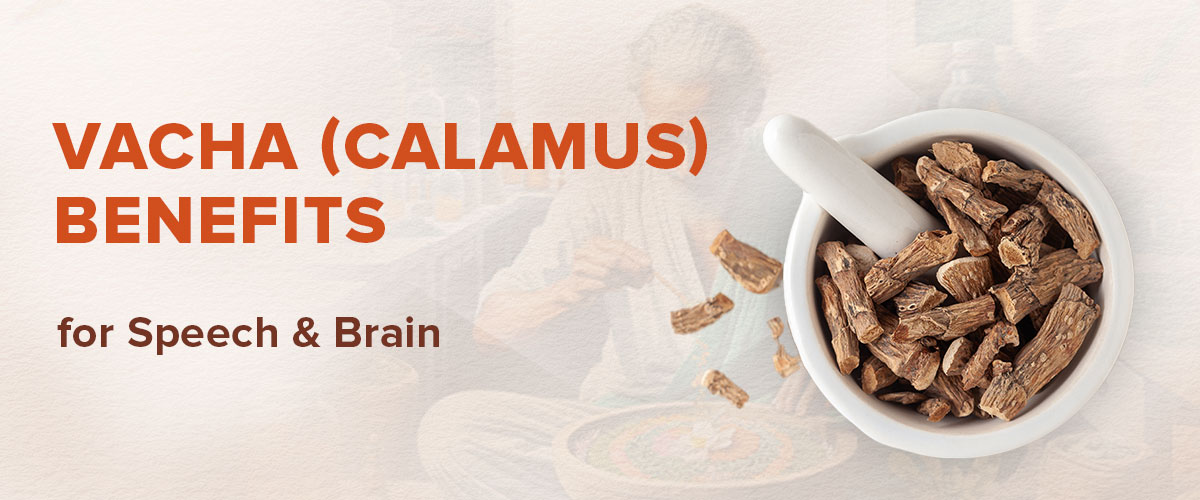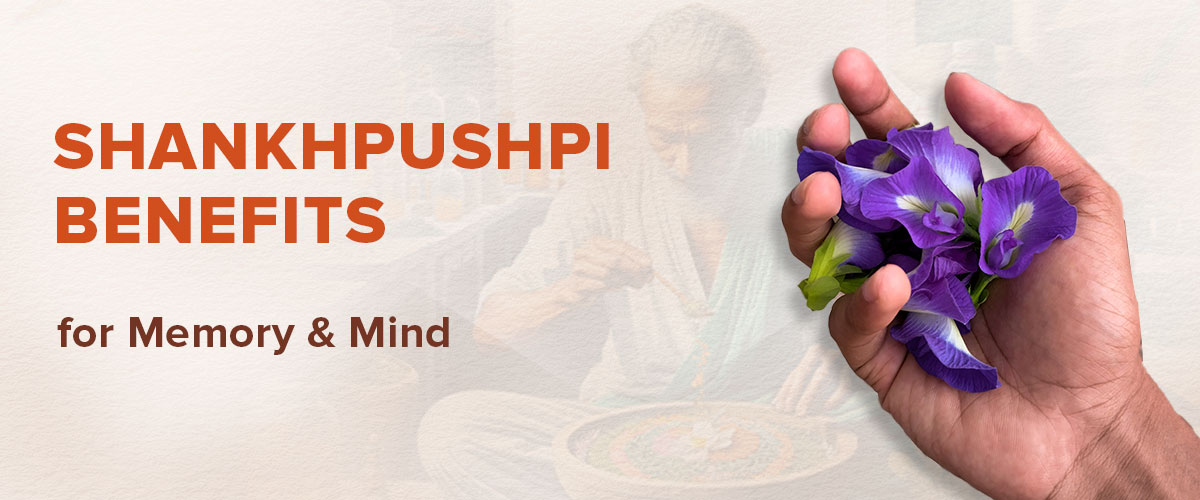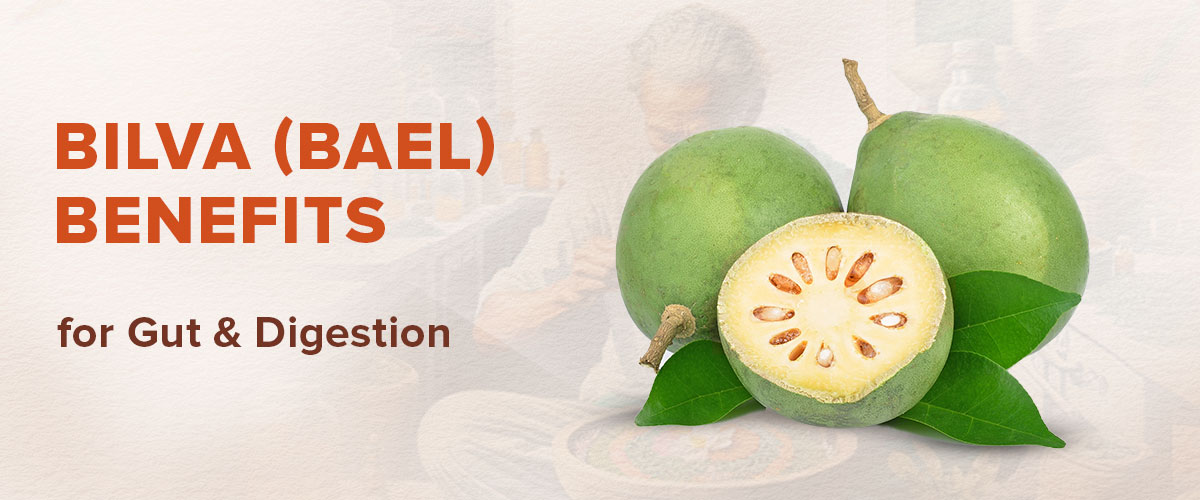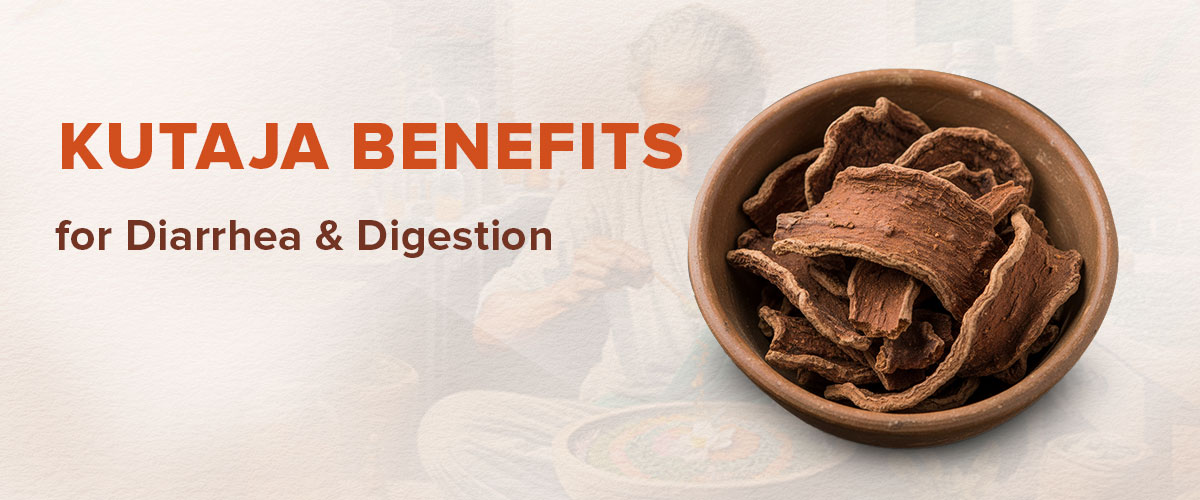Dhania (Coriander): Benefits, Uses, and Healing Properties
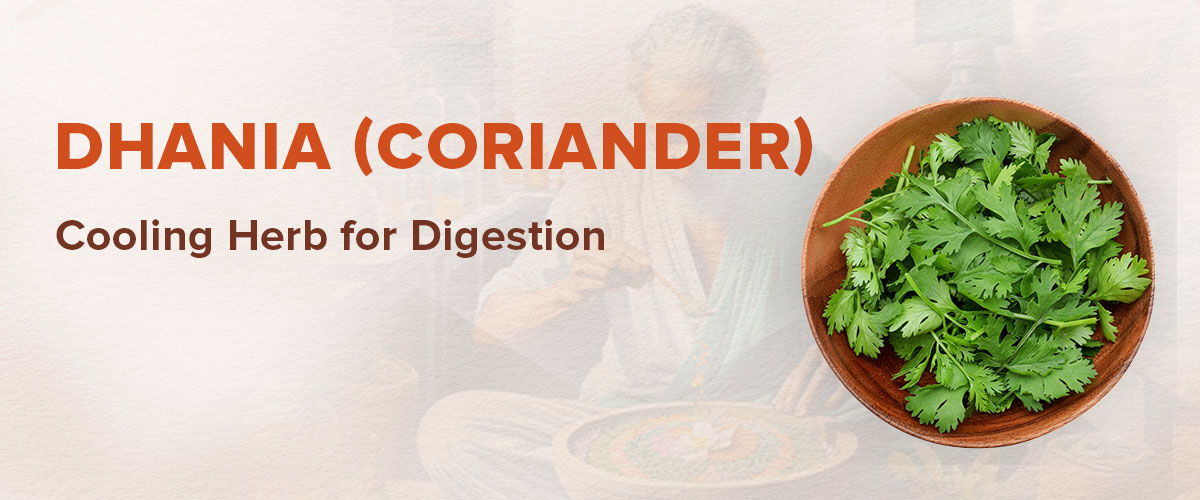
Dhania is called Coriander in English, and its scientific name is Coriandrum sativum. In Sanskrit, it is called Dhanyaka. This herb is an important part of Indian cooking and traditional medicine. Ayurveda has used Dhania for thousands of years to help with digestion, ease digestive spasms, lower body heat, and make the urinary system healthier.
Dhania is still valued for its healing properties today. For example, in a clinical study of people who were pre-diabetic, it was found that eating coriander seed powder every day lowered their average fasting blood sugar from about 119.65 mg/dL to 111.92 mg/dL. This makes it clear how coriander can help people control their blood sugar levels today. But dhania benefits actually cover a much wider range. Let us discover how.
What is Dhania & Its Ayurvedic Properties?
Dhania is an Ayurvedic herb that has many healing properties. Let's see what Ayurveda says about the four main qualities of this herb.
- Taste (Rasa): Dhania can be both bitter (Tikta) and sweet (Madhura). This mix is great for cooling down the body's heat (Pitta) and helping with digestion without being too strong.
- Characteristics (Guna): Ayurveda says that Dhania is light (Laghu) and a little oily (Snigdha). This means that your body can easily break it down and it won't put too much stress on your digestive system. The lightness helps with bloating and heaviness, and the oiliness keeps the stomach calm.
- Strength (Virya): Dhania (Sheeta) makes the body feel cooler. Coriander can help you cool down naturally if you often feel uncomfortable because of the heat, like being too thirsty or having excess acidity.
- Effect After Eating (Vipaka): Dhania leaves a sweet (Madhura) taste in your mouth that helps nourish your tissues and slowly brings your doshas back into balance.
Dhania Benefits for Your Health
Dhania, or coriander, is a simple herb that has many health benefits outside of the kitchen. You can use fresh leaves or dried seeds of dhania to help keep your body in balance in many ways. Let's look at how it helps from both a modern scientific and an Ayurvedic point of view.
1. Keeps your Digestion Healthy
Ayurvedic View: Ayurveda says that dhania has both Deepana (appetite-stimulating) and Pachana (digestive) effects. It helps with gas, stomach pain, and feeling full or heavy.
Modern View: Recent research has shown that Dhania contains chemicals like linalool and borneol that can help calm the stomach, relieve indigestion, and also reduce IBS symptoms.
2. Helps Keep Blood Sugar Levels Low
Ayurvedic View: As per Ayurveda, Dhania tastes bitter and cools the body, which makes it a good way to balance out Pitta and Kapha, which are doshas that are often linked to metabolic imbalance.
Modern View: Coriander seeds may help lower blood sugar by boosting insulin production. People who were pre-diabetic and ate coriander seed powder every day found their blood sugar levels reduced by almost 6%.
3. Helps with Pain and Swelling in the Joints
Ayurvedic View: Dhania is believed to calm inflamed joints because it has anti-Pitta properties and contains Cineole and linoleic acid, which Ayurveda says can help with internal heat and swelling.
Modern View: Coriander may help with arthritis pain because it has natural anti-inflammatory properties. It helps ease pain in the joints and muscles in a mild and natural way.
4. Improves Skin Health
Ayurvedic View: Dhania cools the blood and gets rid of Ama to make the skin clearer. Ayurvedic skin care often uses this to get rid of acne and pimples.
Modern View: Modern studies show that putting coriander paste on the skin can help with acne, blackheads, and irritation because it has antibacterial and astringent properties.
5. Works as a Diuretic
Ayurvedic View: Ayurveda says that Dhania's mutral (diuretic) property helps the kidneys and bladder by getting rid of toxins in the urinary system.
Modern View: Coriander may help get rid of small kidney stones and prevent the body from holding onto too much water by making you urinate more.
Dhania for Specific Health Problems
Let us now see how Dhania benefits can help with specific health conditions too.
Helps Control Thyroid Problems
A common way to improve thyroid health is to drink water with soaked coriander seeds in the morning. Dhania has natural minerals and antioxidants that help keep hormones in check and bring down swelling in the thyroid gland. Dhania water may help if you are feeling tired or gaining weight because your thyroid isn't working properly.
Helpful for Bad Breath and Mouth Ulcers
Dhania has citronellol in it, which is a natural antiseptic. Ayurveda says that this can help heal mouth ulcers and cool down heat in the mouth. It also makes your breath smell better, so it's a good way to get rid of bad breath.
Helps with Cramps and Muscle Spasms
Dhania might help if you get muscle cramps a lot. Coriander is an antispasmodic, which means it relaxes the muscles and stops spasms in the arms, legs and stomach. Ayurveda says that Dhania can help with cramps and twitching that are related to Vata.
Good for the Liver
Coriander is light and cool, which makes it great for calming your liver. Ayurveda says that it helps the liver get rid of toxins (Ama), which helps it detox. When your liver is working well, you can feel more energy and improved digestion.
Kills Worms in the Intestines
Dhania has anthelmintic properties, which means it can stop worm eggs from hatching in your gut. Coriander can be a gentle herbal support if you are facing problems with intestinal parasites, especially in kids.
Helps with Anemia
You might not be getting enough iron if you often feel weak, tired, or dizzy. Dhania seeds are high in iron and may help raise hemoglobin levels naturally. If you get anemia generally and frequently, eating dhania seeds every day can help.
Helps Prevent Osteoporosis
Dhania has calcium, vitamin K, and other nutrients that help keep bones healthy. Adding coriander to your meals can help make your bones stronger and last longer if you're worried about weak bones or osteoporosis. This is even more useful for elders.
Who Should Use Dhania?
Dhania is cool and full of natural healing power, so it can be used by people of all ages and health needs. Let us see how:
Dhania for Women
Dhania is good for women in a number of ways. Dhania water may help if you have hormonal imbalances, irregular periods, or PCOS. It does this by gently supporting your metabolism and lowering your internal heat. It also helps with menopause, especially if you have hot flashes or are irritable.
Dhania for Kids
Small amounts of Dhania are safe for kids to use. If your child often has stomach pain, gas or mild diarrhoea, giving them Dhania water or a pinch of ground dhania seeds in their food may help. Its anthelmintic property also helps with intestinal worms, which are common in kids as they grow.
Dhania for Seniors and Older Adults
Dhania can help keep you healthy every day if you're a senior. It helps with joint pain, controls blood pressure, and boosts appetite, which tends to fade with age. It has a natural amount of calcium that helps keep your bones strong, and it also has a mild diuretic effect that helps with detox and kidney health.
Can Dhania Be Taken with Other Medicines?
Dhania is a natural herb, but it can still affect how certain modern medicines work. So, it’s important to stay informed if you're taking regular medication.
If you’re on diabetes medicine, be careful. Dhania may naturally lower blood sugar, and when combined with anti-diabetic drugs, it could cause your sugar levels to drop too low. The same applies if you're on blood pressure medication.
Also, if you have breathing problems or asthma, large amounts of Dhania (especially raw leaves) might not suit you due to its cool nature.
Therefore, always speak with a Jiva-certified doctor before adding Dhania in large amounts to your diet, especially if you take regular medicines for chronic conditions.
Is Dhania Safe? Who Should Avoid It?
Dhania is generally safe when used in small amounts, like in your daily meals or as a mild herbal drink.
Common Side Effects of Dhania
If you take large amounts of Dhania, you might notice side effects like:
- Skin irritation or itching
- Allergic reactions (rare but possible)
- Low blood sugar if you’re already taking diabetes medicines
- Drop in blood pressure if you’re on BP medications
Its cooling nature may also not suit people with excess Vata or cold-related issues, such as frequent cough, asthma, or weak digestion.
Dhania vs Other Ayurvedic Herbs
Dhania is a cooling, digestive-friendly herb, but how does it compare to other good Ayurvedic herbs? Let us compare dhania with some of the commonly used herbs to help you understand their different roles in your health routine.
Dhania vs Ajwain (Carom Seeds)
|
Feature |
Dhania (Coriander) |
Ajwain (Carom Seeds) |
|
Best Use |
Digestion, cooling Pitta, urinary health |
Bloating, indigestion, cough, gas relief |
|
Nature |
Cooling (Sheeta) |
Heating (Ushna) |
|
Taste (Rasa) |
Bitter + Sweet |
Pungent + Bitter |
|
Effect on Mind |
Calming, soothing |
Stimulating, clears mental fog |
|
Effect on Body |
Detoxifies, cools, hydrates |
Warms, clears mucus, strengthens digestion |
Dhania vs Fennel (Saunf)
|
Feature |
Dhania (Coriander) |
Fennel (Saunf) |
|
Best Use |
Digestion, cooling heat, skin health |
Indigestion, fresh breath, hormone balance |
|
Nature |
Cooling (Sheeta) |
Mildly Cooling |
|
Taste (Rasa) |
Bitter + Sweet |
Sweet |
|
Effect on Mind |
Cooling, calming |
Soothing, mildly uplifting |
|
Effect on Body |
Detoxifying, blood-purifying |
Strengthens digestion, relieves acidity |
Conclusion
Dhania is a small herb that can help with a lot of different health issues, including digestion, skin, hormones, and even stress. This is what makes Ayurveda so great.
But everybody is unique. What works for one person might not work for another. That's why it's always recommended to talk to a Jiva doctor before adding any herb to your daily routine.
Call our Jiva experts at 0129-4264323 today for personalised help with any health issue you may be facing.
FAQs
What will happen if you drink Dhaniya water every day?
Drinking Dhaniya water every day might help cool your body, improve digestion, reduce bloating, and keep your blood sugar levels stable. But don't take too much without first talking to a Jiva doctor.
What are the benefits of coriander?
Coriander helps with digestion, keeps blood sugar levels stable, lowers inflammation, supports skin health, freshens breath, and may even help with mild detox and kidney health.
What is the medicinal use of Dhaniya?
Ayurveda uses Dhaniya to treat skin problems, hormonal imbalances, urinary problems, and stomach problems. Ayurveda believes that it cools the body, stops spasms, and cleanses the body.
Who shouldn't drink coriander water?
If your blood pressure or blood sugar is very low, or if you have asthma or a cough that gets worse when it's cold, you should stay away from coriander water or talk to a Jiva Ayurveda expert first.
Does coriander cleanse the liver?
Yes, coriander can help your body get rid of toxins. It helps the liver and gets rid of toxins, especially if you often feel hot, acidic, or have trouble digesting food.
Is coriander good for people with arthritis?
Coriander has anti-inflammatory substances, which may help ease pain and swelling in the joints. Ayurveda often uses it to relieve arthritis pain, especially pain that is related to Pitta.
Can Dhania help you lose weight?
Yes, Dhania water or coriander seeds may help you lose weight by making your digestion better, reducing bloating, and getting rid of extra water in your body. It's not a miracle cure, but it can help you if you live a healthy life the Ayurvedic wat.
Is it okay for kids to have Dhania?
Yes, kids can safely eat small amounts of Dhania. It can help with stomach pain, gas, or worms. Just don't give it to them in big doses, and if your child is sick, always talk to a doctor first.



 Prev
Prev





